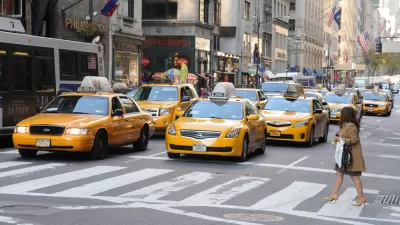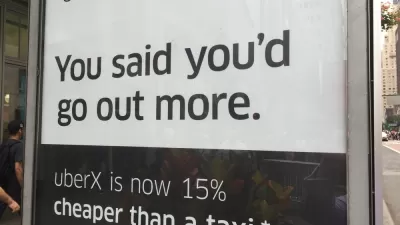Essentially, Uber and Lyft chose a tax on rides instead of a gross-receipts tax.

"San Francisco lawmakers want to tax Uber and Lyft rides, and both companies say that’s OK with them," reports Carolyn Said.
"The proposed tax, which applies only to trips that originate in San Francisco, would levy a 3.25 percent tax on net rider fares for single-party trips and 1.5 percent on shared rides," according to Said.
The San Francisco County Transportation Authority will be responsible for spending the $30 million in expected revenue generated by the new tax on transit projects, if the State Legislature grants San Francisco powers to tax ride-hailing trips.
The ride tax eliminates the need for a ballot initiative planned for November "that would have asked voters to tax ride-hailing companies’ gross receipts at rates up to 0.975 percent." Rachel Swan reported in more detail on that proposal by Supervisor Aaron Peskin in April 2018.
The potential for a political fight over the gross-receipts tax paved the way for the new tax on rides, according to Said.
FULL STORY: In compromise with SF Supervisor Peskin, Uber and Lyft agree to new ride tax

Planetizen Federal Action Tracker
A weekly monitor of how Trump’s orders and actions are impacting planners and planning in America.

Maui's Vacation Rental Debate Turns Ugly
Verbal attacks, misinformation campaigns and fistfights plague a high-stakes debate to convert thousands of vacation rentals into long-term housing.

Restaurant Patios Were a Pandemic Win — Why Were They so Hard to Keep?
Social distancing requirements and changes in travel patterns prompted cities to pilot new uses for street and sidewalk space. Then it got complicated.

In California Battle of Housing vs. Environment, Housing Just Won
A new state law significantly limits the power of CEQA, an environmental review law that served as a powerful tool for blocking new development.

Boulder Eliminates Parking Minimums Citywide
Officials estimate the cost of building a single underground parking space at up to $100,000.

Orange County, Florida Adopts Largest US “Sprawl Repair” Code
The ‘Orange Code’ seeks to rectify decades of sprawl-inducing, car-oriented development.
Urban Design for Planners 1: Software Tools
This six-course series explores essential urban design concepts using open source software and equips planners with the tools they need to participate fully in the urban design process.
Planning for Universal Design
Learn the tools for implementing Universal Design in planning regulations.
Heyer Gruel & Associates PA
JM Goldson LLC
Custer County Colorado
City of Camden Redevelopment Agency
City of Astoria
Transportation Research & Education Center (TREC) at Portland State University
Jefferson Parish Government
Camden Redevelopment Agency
City of Claremont





























